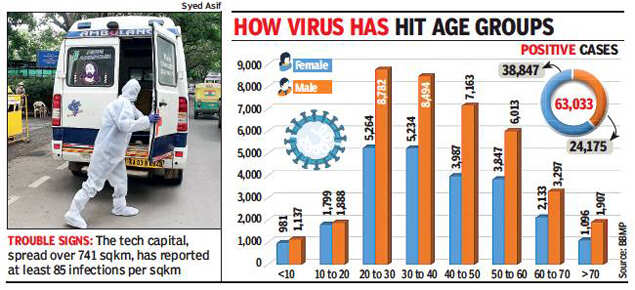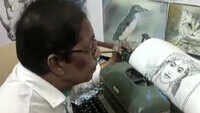
BENGALURU: At least 30 of the city’s 198 wards have over 300 active coronavirus infections each, and many other areas are quickly approaching that level. According to the reports from BBMP’s Covid-19 war room, 148 wards have 100 to 200 active cases each. Only 20 wards have fewer than 100 cases.
As on August 4 (Tuesday), Bengaluru had reported 63,033 positive cases. Of these, 34,021 are ongoing cases.
The tech capital, which is spread over 741 square kilometres, has reported at least 85 Covid cases per square kilometre; 45 of these are active.

A health official said it was likely that there were more cases than on record. “Look at the state and city numbers. The positivity rate in Karnataka is 9.8 per cent for about 14 lakh tests conducted and in Bengaluru, the positivity rate is 17.8 per cent for over 3.3 lakh tests. Disregard for distancing and mask rules has contributed to the spread of the virus across the city,” he added.
Another official in Vijayanagar subdivision said the containment zone policy needed a relook. “Containment zones are now restricted to a house or a road, which doesn’t work. BBMP needs to hold special drives in such areas and conduct tests to isolate suspected cases,” the official said.
In a 24-hour period ending on Tuesday evening, three wards crossed the mark of 300 active infections each and two hit the 100-mark. Lapses in contact tracing, which slowed down in June and July, had proved costly, the official added.
Experts say that the state government should first acknowledge that the pandemic is peaking in the city and then devise appropriate strategies. Dr Satyanarayana Mysore, head of department and consultant, pulmonology, Manipal Hospitals, said contract tracing might not help in the current circumstances. He suggested massive door-to-door screening instead. Zonal travel restrictions, sensitising communities at the ward level and seroprevalence studies also need consideration, he said. Community leaders should be taken into confidence and crowd gatherings should be restricted.
‘Reverse quarantine’ to keep the elderly safe should be promoted and encouraged, Dr Mysore added.
As on August 4 (Tuesday), Bengaluru had reported 63,033 positive cases. Of these, 34,021 are ongoing cases.
The tech capital, which is spread over 741 square kilometres, has reported at least 85 Covid cases per square kilometre; 45 of these are active.

A health official said it was likely that there were more cases than on record. “Look at the state and city numbers. The positivity rate in Karnataka is 9.8 per cent for about 14 lakh tests conducted and in Bengaluru, the positivity rate is 17.8 per cent for over 3.3 lakh tests. Disregard for distancing and mask rules has contributed to the spread of the virus across the city,” he added.
Another official in Vijayanagar subdivision said the containment zone policy needed a relook. “Containment zones are now restricted to a house or a road, which doesn’t work. BBMP needs to hold special drives in such areas and conduct tests to isolate suspected cases,” the official said.
In a 24-hour period ending on Tuesday evening, three wards crossed the mark of 300 active infections each and two hit the 100-mark. Lapses in contact tracing, which slowed down in June and July, had proved costly, the official added.
Experts say that the state government should first acknowledge that the pandemic is peaking in the city and then devise appropriate strategies. Dr Satyanarayana Mysore, head of department and consultant, pulmonology, Manipal Hospitals, said contract tracing might not help in the current circumstances. He suggested massive door-to-door screening instead. Zonal travel restrictions, sensitising communities at the ward level and seroprevalence studies also need consideration, he said. Community leaders should be taken into confidence and crowd gatherings should be restricted.
‘Reverse quarantine’ to keep the elderly safe should be promoted and encouraged, Dr Mysore added.

Coronavirus outbreak
Trending Topics
LATEST VIDEOS
City
 Start of construction of Ram temple in Ayodhya marks fulfilment of key Sangh Parivar goal, RSS believes
Start of construction of Ram temple in Ayodhya marks fulfilment of key Sangh Parivar goal, RSS believes  MP Congress celebrates Ram Mandir Bhumipujan event at State Party Headquarter in Bhopal
MP Congress celebrates Ram Mandir Bhumipujan event at State Party Headquarter in Bhopal  Meghalaya: 24-kg tumour removed from woman's abdomen
Meghalaya: 24-kg tumour removed from woman's abdomen  Pending salaries for 3 months North Delhi Municipal Corporation teachers’ associations warn authorities
Pending salaries for 3 months North Delhi Municipal Corporation teachers’ associations warn authorities
More from TOI
Navbharat Times
Featured Today in Travel
Get the app





